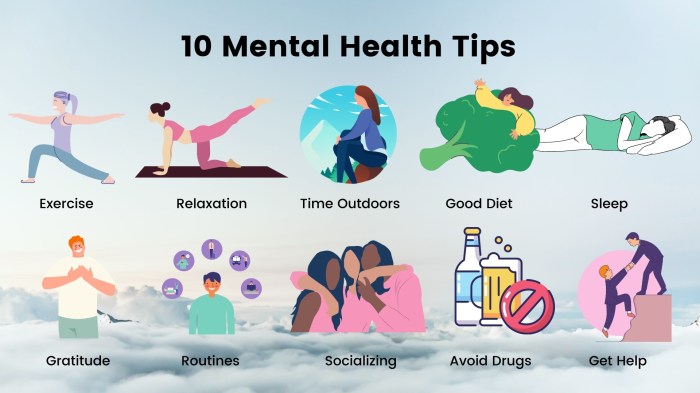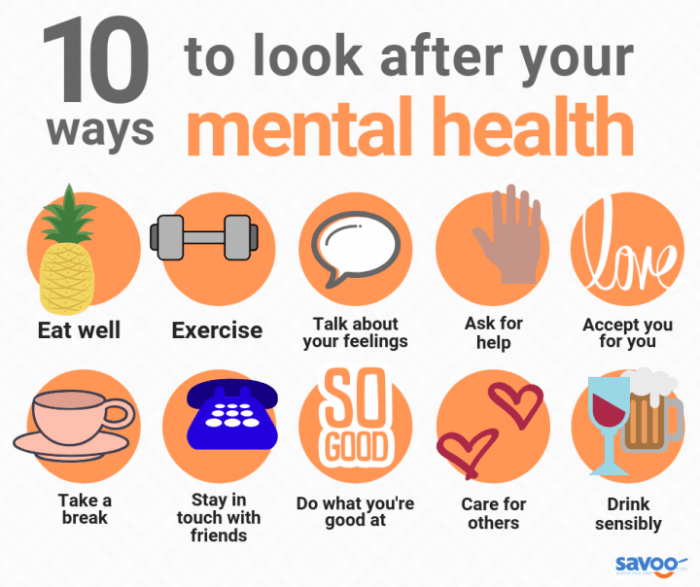Kicking off with Mental Wellness Tips, this intro is all about keeping it real and helping you navigate the world of mental health like a boss. Get ready to dive into some top-notch advice that’s gonna take your well-being game to the next level.
Importance of Mental Wellness
Maintaining good mental wellness is essential for overall well-being. It involves managing stress, emotions, and relationships effectively to lead a fulfilling life.
Mental Wellness and Physical Health
Prioritizing mental wellness has a direct impact on physical health. Chronic stress and mental health issues can lead to a variety of physical ailments, such as high blood pressure, heart disease, and weakened immune function.
Benefits of Prioritizing Mental Wellness
- Improved mood and emotional well-being
- Enhanced ability to cope with stress and challenges
- Better relationships with others
- Increased productivity and focus
- Reduced risk of developing mental health disorders
Tips for Improving Mental Wellness: Mental Wellness Tips
Feeling overwhelmed and stressed out? Here are some strategies to help you improve your mental wellness and overall well-being.
Managing Stress Effectively, Mental Wellness Tips
Stress is a common part of life, but it’s important to manage it effectively to avoid burnout and other negative impacts on mental health.
- Practice deep breathing exercises to calm your mind and body.
- Schedule regular breaks throughout the day to give yourself time to recharge.
- Engage in activities you enjoy, such as hobbies or spending time with loved ones.
Promoting Mindfulness and Staying Present
Mindfulness can help you stay grounded and focused on the present moment, reducing anxiety and improving overall mental well-being.
- Try meditation or yoga to cultivate mindfulness and awareness.
- Avoid multitasking and focus on one task at a time to stay present and attentive.
- Practice gratitude by reflecting on the positive aspects of your life each day.
Importance of Regular Physical Activity
Exercise is not just good for your physical health, but it can also have a positive impact on your mental well-being.
- Engage in regular physical activity, such as walking, jogging, or dancing, to release endorphins and reduce stress.
- Set realistic fitness goals to stay motivated and committed to your exercise routine.
- Find an exercise buddy to make workouts more enjoyable and hold each other accountable.
Creating a Supportive Environment

Creating a supportive environment is crucial for maintaining good mental wellness. A strong social network, positive relationships, and a healthy work-life balance all play a significant role in ensuring mental well-being.
Role of a Supportive Social Network
A supportive social network provides emotional support, encouragement, and a sense of belonging, which are essential for mental wellness. Surrounding yourself with friends, family, or support groups who uplift and validate you can help reduce stress and improve overall mental health.
Tips for Cultivating Positive Relationships
- Communicate openly and honestly with your loved ones.
- Listen actively and empathetically to others.
- Set boundaries to protect your mental and emotional well-being.
- Express gratitude and appreciation for those who support you.
- Engage in activities together that promote bonding and connection.
Impact of a Healthy Work-Life Balance
Maintaining a healthy work-life balance is essential for mental wellness. When work demands take over, it can lead to burnout, stress, and decreased mental well-being. By setting boundaries, prioritizing self-care, and engaging in activities outside of work, you can prevent work-related stress from negatively impacting your mental health.
Self-Care Practices

Taking care of yourself is essential for maintaining good mental health. Engaging in self-care activities can help reduce stress, improve mood, and prevent burnout. Setting boundaries for self-care is equally important to ensure you prioritize your well-being. Establishing self-care routines can greatly contribute to overall mental wellness.
Examples of Self-Care Activities
- Practicing mindfulness and meditation
- Taking breaks when needed
- Engaging in physical exercise
- Getting enough sleep
- Connecting with friends and loved ones
- Pursuing hobbies and interests
The Importance of Setting Boundaries for Self-Care
Setting boundaries allows you to prioritize your needs and prevent burnout. It helps you establish limits on your time and energy, ensuring you do not overcommit or neglect yourself.
How Self-Care Routines Improve Mental Health and Reduce Burnout
- Regular self-care routines can help manage stress levels and improve overall mood.
- By taking time for yourself, you can recharge and feel more energized to tackle daily challenges.
- Self-care practices promote self-awareness and self-compassion, leading to better mental well-being.


